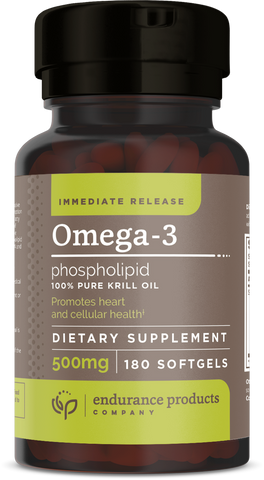If heart health is top of mind, you’ll want to know all the latest about the Omega-3 Index. Not only is this laboratory value an emerging biomarker of cardiovascular health, it’s also one smart way to find out if your diet and supplement routine provides the omega-3 fatty acids your body needs, especially for heart health. Here are five things you need to know about the Omega-3 Index.
1. What is the Omega-3 Index?
The Omega-3 Index measures the amount of two specific omega-3 fatty acids in your red blood cell membranes. One fatty acid is EPA, which is short for eicosapentaenoic acid. The other is DHA or docosahexaenoic acid. The index reflects your intake of these omega-3 fatty acids from foods and dietary supplements over the previous 3 months.
2. What is a heart-healthy Omega-3 Index?
The Omega-3 Index is measured as a percent of total fatty acids. For heart health, experts recommend EPA and DHA should make up at least 8 percent of the fatty acids in your red blood cell membranes. This equates to an Omega-3 Index of at least 8 percent. For comparison, an Omega-3 Index of 4 percent or less is associated with the least cardioprotection.
3. What is the typical Omega-3 Index?
According to a 2016 global survey of healthy adults, Americans have an Omega-3 Index around 4 percent. By contrast, people living in regions where seafood is a dietary staple have an average Omega-3 Index above the 8 percent target. Think countries around the Sea of Japan and in Scandinavia as well as areas of the world where the typical Western diet is uncommon.1
4. How does your diet help increase the Omega-3 Index?
Eating fatty fish, which are rich in EPA and DHA fatty acids, can help you achieve (and maintain) an Omega-3 Index in the heart-healthy range. Salmon is one of the best food sources. Mackerel and other fatty fish like tuna, trout, herring, and sardines are good sources.
But food sources may not be enough, according to one study. In fact, the researchers found that those with the best chance of achieving a desirable Omega-3 Index ate three servings of fish weekly and took an EPA+DHA supplement.2
5. How does a supplement help increase the Omega-3 Index?
Omega-3 supplements derived from krill oil and fish oil can help increase your Omega-3 Index, but krill oil may have an advantage. Why? Researchers point to the fact that more than 80% of EPA and DHA in krill oil is found in the highly bioavailable phospholipid form. By contrast, fish oil contains omega-3 fatty acids in the triglyceride form.
In one study involving healthy adults, Canadian researchers found supplementing with krill oil capsules was twice as effective at raising the Omega-3 Index as supplementing with fish oil capsules with the same amount of EPA and DHA.3
In another study, researchers found healthy adults who supplemented with one specific type of krill oil (the Superba™ brand) significantly increased their Omega-3 Index. The participants started the study with an average Omega-3 Index of about 5.7 percent and were asked to take one daily capsule of Superba™ krill oil (providing 240 mg of EPA and DHA) for 12 weeks. Importantly, they were also asked to avoid foods or other supplements that contained omega-3 fats. The researchers measured each participant’s Omega-3 Index using a finger-prick blood test at the beginning of the study and after 6 and 12 weeks of supplementation.4
Results indicate the Superba™ krill oil supplement increased the average Omega-3 Index by 10% as early as 6 weeks. Since the background diet was essentially devoid of omega-3s and direct blood measurements were taken, the researchers concluded the 10% boost could be attributed to the krill oil supplement.
These findings build on an earlier study that confirms supplementing with Superba™ krill oil significantly increases the blood level of EPA and DHA compared to a control (olive oil).5
The bottom line
It’s clear your intake of omega-3 fats can help boost your Omega-3 Index. So, you’ll want to make sure you’re consuming what you need to protect your heart.
Start by adding more dishes with fatty fish to your weekly menu. Transform canned salmon into crispy salmon cakes. Spruce up your favorite pasta and veggie dish by adding tuna. Or, for the adventurous, try a sardine paté. (You’ll find these recipes and more in Good Food, Great Medicine, one of our favorite resources for heart-healthy recipes.)
Next, add a daily omega-3 supplement like Omega-3 Phospholipids. We’re big fans of research-backed ingredients, which is why you’ll only find Superba™ 100% Pure Krill Oil in this supplement. Plus, Superba™ krill oil is a source of astaxanthin, a powerful antioxidant that helps the omega-3 fats remain fresh throughout the shelf life of the product.
Start today with a heart-smart diet made better with Omega-3 Phospholipids.
References
1. Stark KD, Van Elswyk ME, Higgins MR, Weatherford CA, Salem N Jr. Global survey of the omega-3 fatty acids, docosahexaenoic acid and eicosapentaenoic acid in the blood stream of healthy adults. Prog Lipid Res. 2016;63:132-52. PMID: 27216485.
2. Jackson KH, Polreis JM, Tintle NL, Kris-Etherton PM, Harris WS. Association of reported fish intake and supplementation status with the omega-3 index. Prostaglandins Leukot Essent Fatty Acids. 2019;142:4-10. PMID: 30773210.
3. Ramprasath VR, Eyal I, Zchut S, Jones PJ. Enhanced increase of omega-3 index in healthy individuals with response to 4-week n-3 fatty acid supplementation from krill oil versus fish oil. Lipids Health Dis. 2013;12:178. PMID: 24304605.
4. Bilinski B, Chang D. Fahey P, Bensoussan A. Effect of omega-3 supplementation on the omega-3 blood index and fatty acid biomarkers in healthy individuals. Adv Integr Med. Epub 2019 April 12.
5. Maki KC, Reeves MS, Farmer M, et al. Krill oil supplementation increases plasma concentrations of eicosapentaenoic and docosahexaenoic acids in overweight and obese men and women. Nutr Res. 2009;29(9):609-15. PMID: 19854375.

